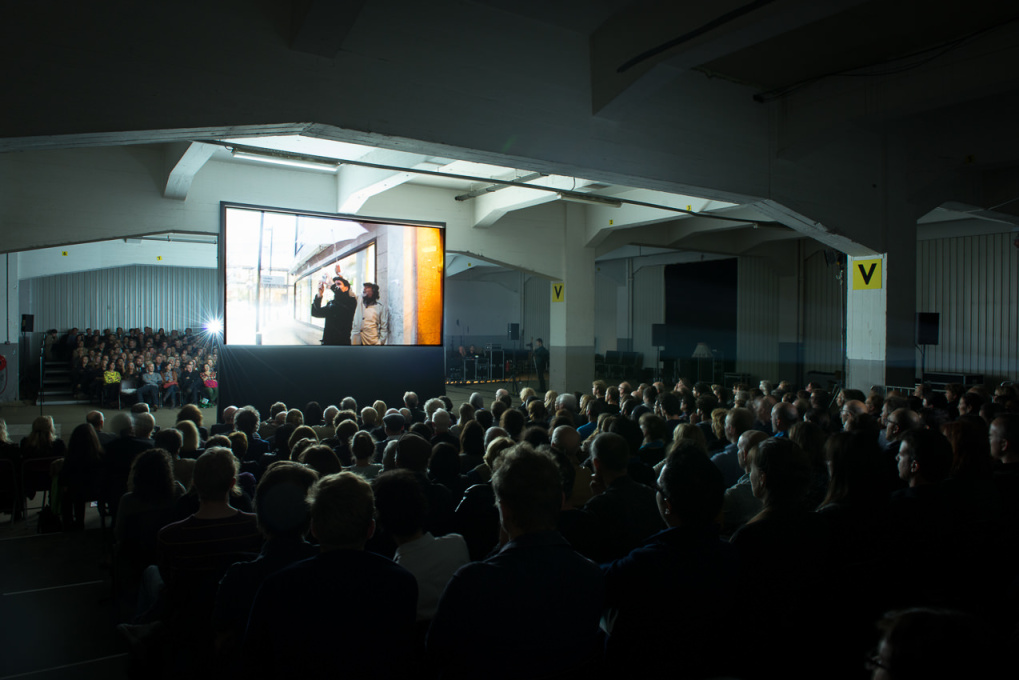This year’s Architecture Film Festival in Rotterdam, which took place from the 10th -13th October was bigger than ever. With three days of the best architecture in the dark, talks and parallel events over the course of a miserably wet weekend, Rotterdam was certainly an interesting place to be. A report from uncube correspondent Cristina Ampatzidou.
The theme of the 7th AFFR was The City as Time Machine, and there could be no better venue to host the screenings than the old port warehouse Fenixloods – a time machine in its own right, harking back to an era when the port of Rotterdam extended right into the heart of the city. The vast industrial hall was scattered with artistic installations inspired by the featured films provided a special architectural atmosphere and the viewing setting with two screens and two tribunes that had viewers facing each other whilst watching the film was an interesting twist.
The opening film, The Competition directed by Angel Borrego Cubero, is a behind-the-scenes account of the absurdity of the starchitect system: Five famous architects, Jean Nouvel, Zaha Hadid, Frank Gehry, Norman Foster – all Pritzker Prize winners – plus Dominique Perrault compete for the new National Museum of Andorra, but they also compete in vanity and arrogance. It struck a chord with the audience, who received it with gales of laughter and undoubtedly many sympathised with the sleepless faces on the screen. In the Q&A following the screening Borrego shared his plans for a follow up film addressing the hot topic of architecture interns, provoking further amused chuckles of approval. See the uncube review here: For the Love of the Game
Thanks to the large architectural community in Rotterdam, the foyer of Lantaren Venster, the main venue of the AFFR, was a vibrant space during the festival, where friends and colleagues met between films, had a drink together and exchanged views on what they’d seen. The continuous rain outside made the foyer even harder to leave and when an electricity blackout darkened almost half the city on the last day, it provided undampened spirits with yet another impromptu opportunity to socialise.
The power cut may have interrupted the screening but it didn’t prevent Belgian director Gerrit Messiaen’s Lucien Hervé, Photograph Malgré lui from being one of the most popular films of the festival. It tells the engrossing story of Le Corbusier’s indispensable photographer, his life in Paris and the spirit of modern times.
Benoit Felici’s Unfinished Italy is also worth a mention. According to the director, the “unfinished” part of the title reflects what has been the predominant architectural style in post war Italy. In his film he sets out to explore these strange architectural remains scattered throughout the Italian landscape and the creative uses they have been put to through a good balance of reportage, humour and poetic images.
Another popular, yet heartbreaking film centred around the National Art School in Havana, planned in 1959, soon after Fidel Castro took power in Cuba. This spectacular building was never fully completed as the initial revolution fervour faded. Unfinished Spaces by Alysa Nahmias and Ben Murray allows the three, then young revolutionary artists commissioned by Castro and Che Guevara to design the building to have their say and uses fascinating historical footage to chronicle a time when architecture was considered capable of changing society.
In the short film category, it’s worth mentioning Marquise by Andreu Meixide, a film about the last domestically used urban palace in central Barcelona. In this intriguing film, we learn about daily life of family and servants in a place that has remained untouched by time – despite only fleetingly meeting the Marquise herself.
With almost 100 films in their programme, it is remarkable that the AFFR managed to stick so close to festival’s theme and still manage to avoid the nostalgia trap. The Time Machine was taken to mean not only a journey back in time, as one would expect from architecture documentaries, but also a critical view on today’s urban environment – how it has been shaped by the past and is moving towards the future. To slightly paraphrase a quote by H. G. Wells used in the festival’s introduction “...walking through this patchwork of streets and buildings from different ages we realize that the city is another big time machine...”
– Cristina Ampatzidou is an independent researcher, architect and urbanist based in Rotterdam





